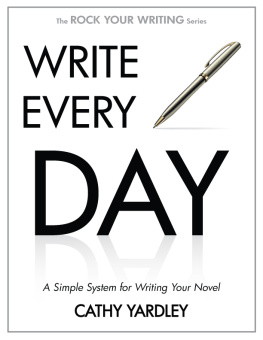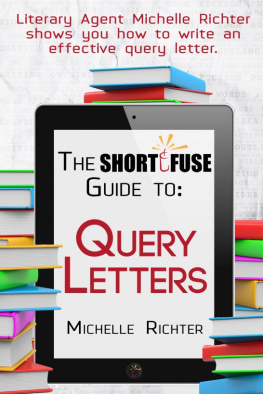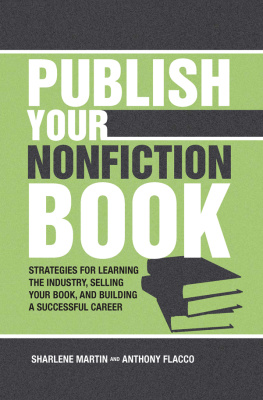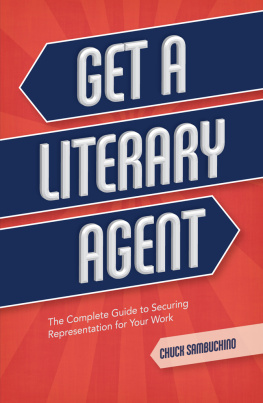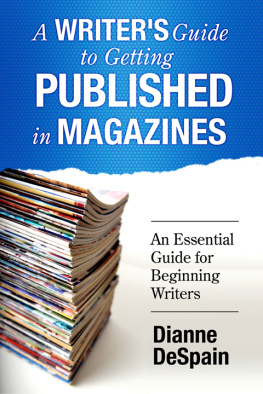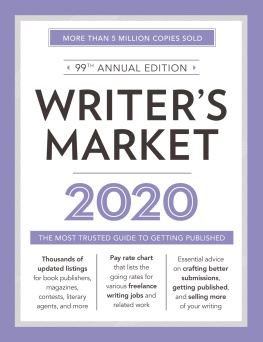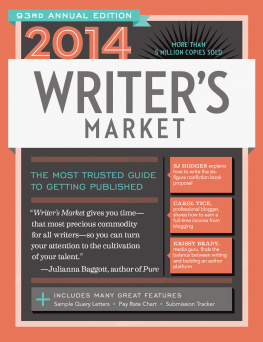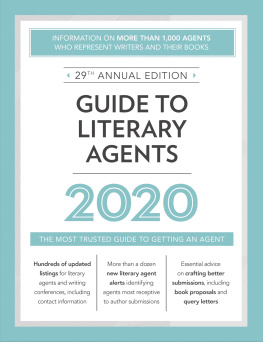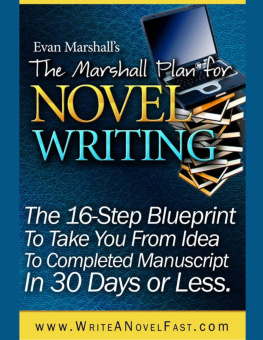
THE WRITERS DIGEST
GUIDE TO
QUERY
LETTERS

www.writersdigest.com
Cincinnati, Ohio
WENDY BURT-THOMAS
The Writers Digest Guide to Query Letters 2008 by Wendy Burt-Thomas. Manufactured in the United States of America. All rights reserved. No other part of this book may be reproduced in any form or by any electronic or mechanical means, including information storage and retrieval systems, without permission in writing from the publisher, except by a reviewer, who may quote brief passages in a review. Published by Writers Digest Books, an imprint of F+W Media, Inc., 4700 East Galbraith Road, Cincinnati, Ohio 45236. (800) 289-0963. First edition.
For more fine books from F+W Media, visit www.fwmedia.com or www.writersdigest.com/books/. To receive a free weekly e-mail newsletter delivering tips and updates about writing and about Writers Digest products, register directly at http://newsletters.fwpublications.com.
12 11 10 09 08 5 4 3 2 1
Distributed in Canada by Fraser Direct, 100 Armstrong Avenue, Georgetown, Ontario, Canada L7G 5S4, Tel: (905) 877-4411. Distributed in the U.K. and Europe by David & Charles Brunel House, Newton Abbot, Devon, TQ12 4PU, England, Tel: (+44) 1626-323200, Fax: (+44) 1626-323319, E-mail: postmaster@davidandcharles. co.uk. Distributed in Australia by Capricorn Link, P.O. Box 704, Windsor, NSW 2756 Australia, Tel: (02) 4577-3555
Library of Congress Cataloging-in-Publication Data
Burt-Thomas, Wendy.
The Writers Digest guide to query letters / by Wendy Burt-Thomas.
p. cm.
ISBN 978-1-58297-566-5 (pbk. : alk. paper)
1. Queries (Authorship) I. Title. II. Title: Guide to query letters.
PN161.B87 2008
808.02--dc22
2008036208
Edited by Lauren Mosko
Designed by Claudean Wheeler
Production coordinated by Mark Griffin

DEDICATION
To my children, Ben and Gracie, who I hope will be inspired to write on paper (instead of walls) one day.
And to Aaron, who pretends not to notice.
TABLE OF CONTENTS
INTRODUCTION
UP FOR THE
CHALLENGE?
S o you wanna be a writer, huh? Are you sure? Really, really sure? Okay, then. As long as youre serious about it, lets get right to point because theres good news and bad news. (You kept your receipt, right?)
The bad news is, everyone wants to be a writer. That means every Tom, Dick, and Harry (or Harriet) with access to a computer (or worsean old typewriter!) is littering the path to YOUR big break with horribly clichd, poorly formatted, and downright unsellable pitches. And as much as youd like to break in that four-hundred-dollar leaf blower, theres no way to get rid of the competition. Your only hope is to write a query that stands out in the crowda genuine nugget among a river of gravel, limestone, and fools gold. Its hard work and its not for the easily discouraged, but if youre still up for the challenge, heres the good news: This book will tell you how to do it.
WHATS AQUERYANYWAY?
If youre planning to pitch article ideas to magazine editors or book ideas to agents or publishers, youre going to need a query letter about 99 percent of the time. This is a one-page letter used to get an editor or agent interested in the work youd like to send him. Sometimes youll be querying to send a piece youve already completed. In other cases, youll essentially be asking to determine if you should write the piece, as in the case of a nonfiction book idea you have. (Yes, you can sell a nonfiction book to a publisher based on an idea. More on that later.)
A query letter is an opportunity to use your brilliance to not only impress an editor (or agent) with your idea, but also demonstrate your ability to follow the specific submission guidelines the publisher or agency gives. In the case of a nonfiction magazine article, for example, youll use the query to tell the editor what angle and topic youll cover, whom youll interview, how long the piece will be, whether you can supply photographs, how your piece will help readers, and for which section of the magazine the piece fits. Whether you send this letter via e-mail or snail mail will be dictated by the guidelines.
In a nutshell, your query is your sales pitch. Youre selling your writing before the editor has even read your manuscript. This is no time to be shy (or conceited); getting published is as much about marketing yourself as it is about the quality of your writing. Maybe more so.
WHY USE A QUERY LETTER?
When I teach my class Breaking Into Freelance Writing, one of the questions Im asked most frequently is, Why cant I just send the article/story/ proposal? While querying for permission to send an article may seem like a waste of time, there is a bit of logic to the apparent madness.
The short answer is editors, agents, and publishers are busy. Very busy. They want the CliffsNotes version of your idea so they can skim it and see if its a good fit. They dont have time to read 4,000-word feature articles, 90,000-word tomes, or even the first few chapters of your historical-paranormal-romantic-science-fiction-western (no matter how highly your mother recommends it). The sheer volume of material that comes across their desks (and virtual inboxes) would be enough to send a paper shredder into early retirement.
First reads require almost everyone in the publishing industry to make snap judgments and immediate decisions. If they didnt, nothing would ever get published because theyd be too busy reading (or sleeping atop of) the unpublishable manuscripts.
WHO WRITES QUERIES?
As a beginning or intermediate writer, expect that youll be writing query letters a lot. More experienced writers can often circumvent the process because theyre either getting regular assignments from an editor or have a strong enough relationship with the editor that they can simply shoot her an e-mail saying, Hi Jane, I have an idea for an article. What do you think?
Granted, there are times when less experienced writers can also skip the query letter. These include:
When a publications guidelines clearly state no query is necessary
Letters to the editor (submission to the so-named section of the newspaper) or other reader-feedback sections (because contributions are generally solicited from readers, not professional writers)
Submissions to certain local or regional publications (which are often comprised of pieces contributed by residents in the area who arent necessarily professional writers)
Submissions to small-readership online publications (which often dont pay and therefore dont require professional queries)
Submissions of poems, greeting card ideas, flash fiction, or fillers (which are short enough to skim and therefore dont require a query)
If youre not sure when its necessary to query, your best bet is to read the writers guidelines of the publication or agency. (When querying an agent, some will require just a query, while others will ask for a complete book proposal.)
KNOWING WHEN YOURE READY
When I first started pitching to magazines, I thought it was about quantity. I would throw together a quick query letter, send it to every magazine I could think of, and then get right back to work on another (poorly written) query. (And this was back before e-mail queries so I just cringe at how many trees I killed, not to mention how much money I wasted on postage and envelopes.) Now that Im more experienced, I realize that getting published isnt about throwing everything at the wall and seeing what sticks; its about
Next page

